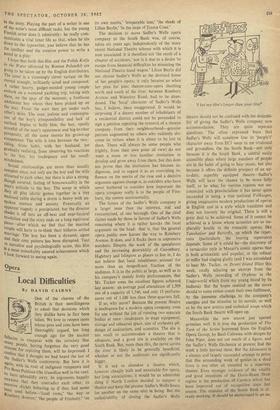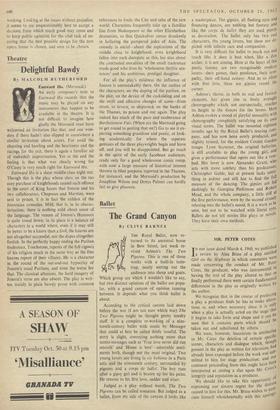°Perot
Local Difficulties
BY DAVID CAIRNS
ONE of the charms of the British is their unwillingness to admit that decisions which they dislike have in fact been taken. We love to reopen cases whose pros and cons have been thoroughly argued, but long enough ago for the ancient
fallacies to reappear with the certainty that Many People, having forgotten the very good reasons for rejecting them, will be impressed. I confess that I thought we had heard the last of the Sadler's Wells controversy. But here it is Pro with its rout of indignant ratepayers and ..r° Eon() Publicos (the Guardian well in the van), Its facts splendidly awry, its arguments happily Unaware that they contradict each other, its been cliches behaving as if they had never been used before—local roots,' the way to Rosebery Avenue,' the people of Finsbury,' 'on
its own merits,' irreparable loss,' the shade of Lilian Baylis,' in the steps of Emma Cons.'
The decision to move Sadler's Wells opera company to the South Bank was, of course, taken six years ago, independently of the more recent National Theatre scheme with which it is now associated. It is therefore not 'the result of a chapter of accidents,' nor is it due to a desire 'to escape from financial difficulties by mounting the National Theatre band wagon.' Lilian Baylis did not choose Sadler's Wells as the destined home of her people's opera; it only became so when her plan for joint theatre-cum-opera shuttling north and south of the river, between Rosebery Avenue and Waterloo Road, had to be aban- doned. The 'local' character of Sadler's Wells has, I believe, been exaggerated. It would be surprising if a decent number of inhabitants of a residential district could not be persuaded to sign a petition opposing the removal of a theatre company from their neighbourhood—genuine patrons augmented by others who suddenly dis- cover its virtues when it is about to be lost to them. There will always be some people who (rightly, from their own point of view) do not want a more or less familiar institution to develop and grow away from them, but this does not prove that the institution has become in- digenous, and to regard it as an overriding in- fluence on the merits of the case and a decisive argument against change is, in outsiders who have never bothered to consider how important the opera company really is to the people of Fins- bury, the merest sentimentality.
The future of the Sadler's Wells company is a larger issue than the interests, real and romanticised, of one borough. One of the chief claims made by those in favour of Sadler's Wells remaining where it is rather knocks the local argument on the head: that is, that the general opera public now knows the way to Rosebery Avenue. It does, and it flocks there in impressive numbers. Despite the work of the speculators and the increasing desirability of- Canonbury, Highbury and Islington as places to live in, I do not believe that local inhabitants, account for more than an insignificant fraction of the audience. It is to the public at large, as well as to his company's mainly lively performances, that Mr. Tucker owes the excellent figures achieved last season: an average paid attendance of 1,309 out of a capacity of 1,540, and only 13 perform- ances out of 1,100 less than three-quarters full.
If so, why move? Because the present theatre is inadequate for a modern opera company, even for one without the job of running two separate bodies at once—inadequate in stage equipment, storage and rehearsal space, size of orchestra pit, design of auditorium, and acoustics. The site is too small to accommodate a theatre that is adequate, and a good site is available on the South Bank. But, more than this, the move across the river is likely to be generally beneficial, whether or not the audiences are significantly bigger.
It is sad to abandon a theatre which, however cheaply built and unsuitable for opera, has long associations; it would be an admirable thing if North London decided to support a theatre and keep the present Sadler's Wells house (or another on the same site) in being. But the undesirability of closing the Sadler's Wells 'I bet my film's longer than your film!'
theatre should not be confused with the desirabi- lity of giving the Sadler's Wells company new accommodation. They are quite separate questions. The often expressed fears that Sadler's Wells will somehow lose its 'people's' character away from EC1 seem to me irrational and groundless. On the South Bank—not only because it is the South Bank, a central easily accessible place where large numbers of people are in the habit of going to hear music, but also because it offers the definite prospect of an up- to-date, superbly equipped theatre—Sadler's Wells will have the chance to be more fully itself, to be what for various reasons not un- connected with provincialism it has never quite succeeded in being, a true national Volksoper, giving imaginative modern productions of operas in English and in a style which translates and does not travesty the original. There is still a great deal to be achieved. Some of it cannot be achieved in a house whose acoustics are so im- placably hostile to the romantic operas, like Tannhaiiser and Butterfly, on which the reper- toire (particularly the touring repertoire) depends. Some of it could be—the discovery of a vernacular style in Mozart's comic operas that is both aristocratic and popular, or the refusal to suffer bad singing gladly (and I was astonished to hear Mr. Tucker, on Desert Island Discs this week, coolly selecting an excerpt from the Sadler's Wells recording of Orpheus in the Underworld which froze my young blood by its badness). But the hopes centred on the move should to some extent create their own fulfilment, by the immense challenge to the company's energies and the stimulus to its morale, as well as by the new artistic and technical scope which the South Bank theatre will open up.
Meanwhile the new season just opened promises well. It is true the production of The Turn of the Screw borrowed from the English Opera Group, by Basil Coleman with designs by John Piper, does not cut much of a figure, and the Sadler's Wells Orchestra at present find the work a little beyond them. But the Idomeneo is a sincere and largely successful attempt to prove that this astounding work of genius in a dead form is not after all unsuited to a repertory theatre. Even stronger evidence of the vitality and good intentions of the Davis-Byam Shaw regime is the production of Carmen which has been improved out of recognition since last season. The stimulus of the South Bank is al- ready working. It should be encouraged to go on working. Looking at the issues without prejudice, it seems to me unquestionably best to accept a decision from which much good may come and to keep public agitation for the vital task of en- suring that the best possible design for the new opera house is chosen, and seen to be chosen.















































 Previous page
Previous page